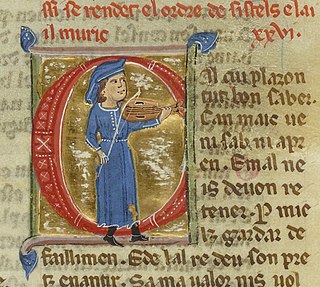| |||
|---|---|---|---|
| +... |

A troubadour was a composer and performer of Old Occitan lyric poetry during the High Middle Ages (1100–1350). Since the word troubadour is etymologically masculine, a female equivalent is usually called a trobairitz.

Sayat-Nova was an Armenian poet, musician and ashugh, who had compositions in a number of languages.

Peire Cardenal was a troubadour known for his satirical sirventes and his dislike of the clergy. Ninety-six pieces of his remain, a number rarely matched by other poets of the age.

Muret is a commune in the Haute-Garonne department, of which it is a subprefecture, in the Occitanie region of southwestern France. Its inhabitants are called Muretains.

Raimon de Miraval(h) (c. 1135/1160 – c. 1220) was a troubadour (fl. 1180–1220) and, according to his vida, "a poor knight from Carcassonne who owned less than a quarter of the castle of Miraval." Favoured by Raymond VI of Toulouse, he was also later associated with Peter II of Aragon and Alfonso VIII of Castile. His senhal for Raymond VI was Audiart.

Perdigon or Perdigo was a troubadour from Lespéron in the Gévaudan. Fourteen of his works survive, including three cansos with melodies. He was respected and admired by contemporaries, judging by the widespread inclusion of his work in chansonniers and in citations by other troubadours.
Huguet de Mataplana was a Catalan nobleman and poet. His name, also spelled Uget, is the diminutive form of Hug, which is the Occitan version of "Hugh".
Nationality words link to articles with information on the nation's poetry or literature.
Nationality words link to articles with information on the nation's poetry or literature.
Nationality words link to articles with information on the nation's poetry or literature.
Nationality words link to articles with information on the nation's poetry or literature.
Nationality words link to articles with information on the nation's poetry or literature.
Nationality words link to articles with information on the nation's poetry or literature.
Nationality words link to articles with information on the nation's poetry or literature.
Nationality words link to articles with information on the nation's poetry or literature.
Nationality words link to articles with information on the nation's poetry or literature.
Nationality words link to articles with information on the nation's poetry or literature.
Nationality words link to articles with information on the nation's poetry or literature.